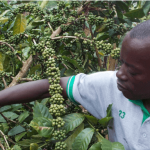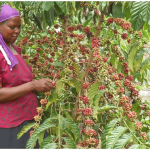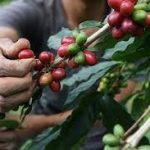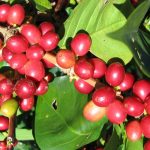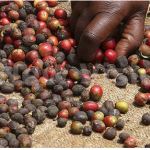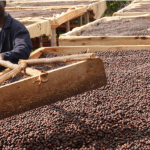My name is Benjamin Kinviirewo Kigongo. I am the marketing officer for Busiro North Organic Farmers Association (Bunofa) and I live in Kijjanangabo, Nakikungube Sub-county, Masuliita County, Wakiso District.
Previously, I farmed the conventional way, growing seasonal crops such as tomatoes and cabbages, maintaining the soil using fertilisers and combating pests and diseases with chemicals. But the cost of the inputs, especially the chemicals, was very high and I was not trained in their use. Thus, my life and the lives of my customers, was exposed to danger.
When extension workers from Kulika Uganda came to our village and explained the dangers of over-used soils and chemicals, I became interested in trying a better alternative.
In 2007, I attended a two-year training programme conducted by Kulika Uganda in sustainable organic agriculture with other farmers in Kakiri and Masuliita.
I got a placement at an organic farm in Kyenjojo for two weeks. After this, I qualified to become an extension worker, helping other farmers to transition to organic farming.
At intervals, I would return to my farm to practise what I had learned about soil conservation and maintaining biodiversity.
Going organic
The transition to organic farming was gradual. Most of the farm had to lie in fallow to allow expulsion of chemicals from the soil. I have five acres of land but I use two of them as I wait for the other three to get out of the fallow period. With time, I began growing vanilla. At the time, it had a high market value.
My main concern is to keep the top soil intact so that water run-off does not carry away its nutrients. To do this, we dig long trenches at the edges of the gardens and plant what we call “kolianda” (Albizia amara) and Tithonia. These offer cover and protect the soil against water run-off.
Organic farming must be integrated with livestock so that the animal waste can be utilised to fertilise the soil. When I clear the gardens, the green waste also feeds the animals.
I make my own compost and manure. We place green, food, and animal waste in deep pits, add ash and cover them.
It takes about two weeks to breakdown, after which we till it into the soil in preparation for planting.
We also make liquid manure which decomposes faster and produces nitrogen. We mix green waste from plant cover with water in a drum and cover. At intervals, stir the mixture. After seven days, pour it around the plants.
I do not mulch because when rain falls, the water and air flow are blocked. Also, chickens, in their search for food, scratch away the mulches. We once used wooden mulches and our home was attacked by termites.
I grow cabbage, tomatoes, coffee, bananas, passion fruits, cucurbits and pawpaw. I have also planted trees such as Mugavu (Albizia coriaria), Natal Fig (Ficus natalensis), and Umbrella tree (Maesopsis eminii) or Musizi as it is known locally. These are for shade in the dry seasons and act as wind barriers.
How we do it
Trees have long roots that can tap potassium that banana plants need, but cannot get because of their shallow roots. When the tree sheds its leaves, they fertilise the soil around the banana plant. As Bunofa, we have decided to introduce apple bananas in our farms.
For livestock, I rear pigs and goats on a small scale. Bunofa is also placing emphasis on its members to rear Kuroilers; each member starting with 20 of them.
We vaccinate but do not administer antibiotics. Instead, we use red pepper, aloe vera), Bitter leaf (Vernonia amygdalina) and Jewelweed (Varnanonia) for simple diseases.
I have adopted beekeeping because cross-pollination can occur in a healthy way since the crops do not have chemicals in their system.
We market our products collectively as Bunofa. Our markets are not conventional because the produce demands a higher price. We do home deliveries, supply the specialty shop at Nogamu [National Organic Agricultural Movement of Uganda] and participate in their farmer’s market.
A section of our fruits are marketed in dry form. We dry using solar kits that keep the nutrients in the fruits intact. When the weather favours, that is on hot days, they take about three days to dry.
When we formed Bunofa, Kulika Uganda assisted us to enter the Participatory Guarantee System (PGS) and funded the facilitator who worked with us. Currently, we have 19 active members, and we monitor each other to ensure that we remain organic. Our goal is to get the East Africa organic (Kilimohai) mark on our products so that we can enter the East African market.
Benefits and challenges
Among the benefits I have got from organic farming is that the health of my family has improved since we began an organic diet. Also, farming is now a profitable profession. It is late January but I am still harvesting coffee because of good soil conservation methods that we use.
The main crops I grow are coffee and bananas. Before, I would harvest a total of 600kgs of coffee beans in the peak season. Now, it is between 800–900kgs. With the bananas, it is about the quality of the output. Before, the banana bunch was small and would fetch Shs5,000–Shs6,000. Now, the bunches are bigger, it goes for Shs10,000 on the market.
I also meet with other farmers and we share our experiences and how to improve our farming. The challenges include a lack of proper water harvesting has made us inconsistent on the market during the dry seasons. I cannot yet afford an irrigation kit to cover the whole area. The cheapest, which costs Shs450,000 can only work on quarter of an acre yet I have five acres.
The roads are terrible yet we have to collect produce from different farms. We also do not have enough crates and boxes to package our produce.
Because we do not have processing plants, we cannot add enough value to our produce. We make juice and wine but getting bottles, labels, and certification is difficult.
As a group, we bought basic equipment for extracting juice and we use our sitting rooms for processing.
We are also challenged by the coffee stem borer. We cannot spray the plant and the disease spreads fast. Now, we pull out the stems and burn them as a temporary remedy.
Perspective> Organic farming: Should Uganda consider it as a viable option?
By Gillian Nantume
Ugandan farmers have always practiced forms of organic farming, crop rotation, fallowing, mulching, and making manure from crop and livestock waste, among others.
Agriculture, being the backbone of the economy, it is estimated that at least 85 per cent of farmers engage in some form of organic farming or the other. It was only in the early 1990s that the certified organic agriculture started.
Between 2002 and 2007, the amount of acreage being farmed this way grew by 60 per cent, more than any other African country.
Locally, organic farming methods and standards are enforced by National Organic Agricultural Movement of Uganda (Nogamu). These place a strong emphasis on protection of the environment and conservation of biodiversity.
Irene Bamugaya Kugonza, standards and certification officer, Nogamu, says their mandate is to promote local and export marketing of organic products from Uganda. “We also build their [farmers] capacity by reaching out, to teach sustainable farming methods, assess their needs and link them to buyers.”
Policy matters
Most farmers are smallholder farmers working on less than 10 acres. “The international market is large and needs large quantities which these farmers cannot supply individually,” says Kugonza. “We encourage them to sell their produce collectively to get the volumes and qualities required for the market.”
Nogamu lists more than 200,000 organic farmers but, according to Kugonza, there is no government policy or regulation in place.
“Anyone can claim to be an organic farmer and sell their produce anywhere. It’s just a level of development we are at as a country. I believe that as the sector becomes more important in terms of revenue and taxes generated on the export market, a regulatory policy will be set up.”
Link to markets
In 2002, the Uganda Organic Standard (UOS) was adopted, while in 2007, as part of the East African Community, Uganda adopted the East African Organic Products Standards (EAOPS).
The latter now serves as a promotional tool and has enhanced trade opportunities in the five member countries. In July 2009, the government released a draft Uganda Organic Agriculture Policy to support the development of organic agriculture.
Locally, organic produce is sold all over the country, in supermarkets and through home deliveries. In its bid to link buyers to farmers, Nogamu launched a monthly farmers’ market and a specialty shop at their offices. Organic products include cotton, coffee, simsim (sesame), dried and fresh fruit, vanilla, fish, honey and bark cloth.
Internationally, though, Ugandan farmers, with certification, export to niche markets in Europe USA, Asia and other parts of Africa. The number of exporters has been growing; it is now 44.
The premium prices that a farmer can fetch in the international market, where there is a wide-spread awareness of organic foods, is a big boost.
Being a landlocked country, high transaction costs, have ensured that we do not compete favourably with countries such as Ghana in the conventional market.
Meet the demand
The lack of general information on organic produce has created a situation where there are many farmers but few buyers. And because of the farming methods, farmers feel entitled to premium prices. Not many people are willing to pay a higher price for a commodity they can buy cheaper in the conventional market.
As such, organic farmers have turned to the international market. Because the consumers are many, farmers find that they have to sell collectively to meet the large quantities ordered.
Because they must obtain a certificate before they are allowed to sell their produce, this has been a deterrent to many because of the costs involved. There are also few certification experts in the sector who can deal with standards and conformity.
Lack of food processing factories to add value to organic produce is a major challenge. Kugonza says, “Farmers export pineapples, with the crown and peelings, which take up space in the packaging. This fetches low prices because of additional work needed before it can be ready for consumption.”
The banking sector considers agriculture a high risk area. While loans are offered to the business sector, agriculture is ignored though some banks have formulated packages for the sector.
To produce more
It is a cycle that should be broken because with low interest loans, organic farmers can buy irrigation kits that would ensure they supply the market at all times, making them able to repay the loans.
Uganda, being of a tropical climate with a higher incidence of disease, the use of antibiotics in livestock is widespread.
Here Kugonza explains, “In organic standards, a farmer is permitted to use antibiotics once a year. But on average, farmers use them at least six times year. Besides, there is no certification for livestock in Uganda so a consumer of livestock products can never be sure what they are consuming is truly organic.”
It is estimated that for the world to achieve food security by 2050, we will need 50 per cent more food than what is produced today. In Uganda, the means for food production are being challenged by climate change, water shortages and limited land.
Remain relevant
The debate on the yields from organic farms as compared to conventional ones is still raging. In 2008, the US Department of Agriculture conducted the Organic Production Survey. One of the findings was that organic farms have lower yields than conventional farms.
Globally, the call is for sustainable and environmentally friendly organic farming. To remain relevant, Ugandan farmers have to think about ways to protect the soil and water for future generations.
“On our packages, customers now expect details of how you are conserving the environment and biodiversity,” Kugonza points out.
“Since we are not consuming our products ourselves, we have to remain relevant in the international produce market.”
certification issues
Studies commissioned by UN’s environment and trade agencies (Unep and Unctad) indicate that farm gate prices of organic pineapples, ginger and vanilla were 300, 185 and 150 per cent higher than conventional products.
Besides providing employment opportunities for the youthful population, by focusing more on organic farming, Uganda will mitigate climate change. The emissions of greenhouse gases per hectare are estimated to be 64 per cent lower than the emissions from conventional farms.
For certification, farmer groups approach Nogamu and, depending on the type of certification desired, inspection is done and a decision taken by a committee at a cost of $100 (Shs289,400 at current rates) for one and a half years. Farmers groups can also opt for a Participatory Guarantee System that ensures that they have uniform procedures and follow specified criteria for sale to the East African market.
For the international market, unless the client requests for specific certification, farm groups are certified by Ugocert, for an average annual fee of $4,500-$6,000 (Shs13m-16.4m). Other certifying bodies include IMO, Ceres, Ecocert, Soil Association and BCS. However, there is a general consensus among core partners that Uganda needs its own international certification standard that is recognised by the European Union (EU). Nogamu has since applied to the EU through Cida for recognition.

